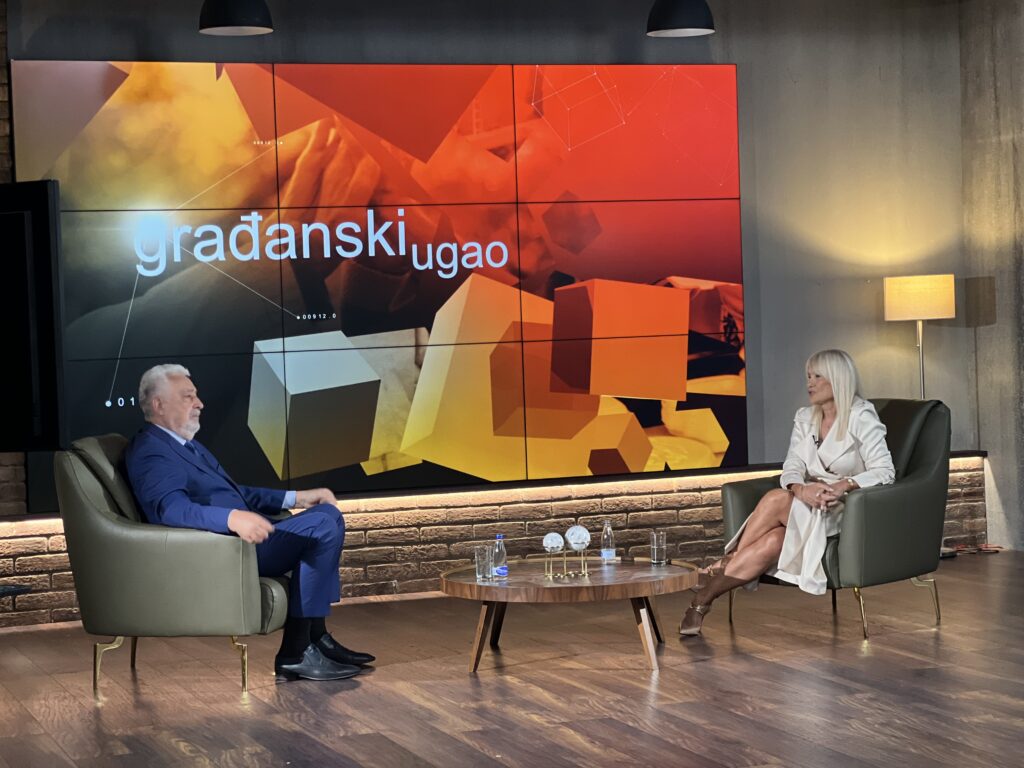On Montenegro’s path to the EU, the main problems are the incompetence, irresponsibility, and impunity of those in power, while the influence of the church has been turned into a political resource rather than a spiritual stronghold, these are some of the highlights from the interview with Zdravko Krivokapić, in the first episode of the new season of Citizen’s Angle, produced by the Centre for Civic Education (CCE) on TVE. On European integration, political (in)stability, links between the Serbia’s Security-Intelligence Agency (BIA) and actors in Montenegro, the role of the church, revisionism and the rise of national tensions in Montenegro, Krivokapić – the first Prime Minister of Montenegro after the fall of the decades-long rule of the Democratic Party of Socialists (DPS) – spoke with Zvezdana Kovač, CCE’s Strategy and Outreach Director.

Krivokapić believes that Montenegro’s path to the EU is determined by three actors – Montenegro itself, the European Union, and the member states. In his view, the European Commission has opened the doors wide, but Montenegro’s problem is its unwillingness to include all stakeholders who can contribute to success. “MPs did not support what was useful, not even when it came to EU legislation. Both the Government and the Parliament declare everything urgent, and urgency is disastrous, because it means someone has not done their job on time and public consultations are lost”, said Krivokapić.
When asked whether he knew who he was entering into a political project with when formation the Government and how he chose his ministers, Krivokapić admitted that he did not know most of the politicians. “I was aware of the environment, but for me it was all a great surprise. Still, the greatest value of that time was the peaceful transition of power and the proof that change was possible”, he emphasized. He rejects criticisms that he selected ministers based on religious or ideological grounds. “I chose ministers based on their CVs. I had issues with the choice for defence, education, and capital investments. The rest was done according to expertise ”, Krivokapić was firmly, adding that Dritan Abazović, the then Deputy Prime Minister, selected the Minister of the Interior. “I had to defend his choice at a press conference by reading the CV, and I cound not find a single relevant connection to that function, except that he had been involved in protests”, he explained.
“I wish it had been formed in Ostrog, under the protection of Saint Vasilije. But it wasn’t, although as a believer it would have meant something to me ”, said Krivokapić, responding to remarks that his Government was formed in the Ostrog Monastery, emphasizing that not a single candidate was chosen by the church. He explained that the term “apostolic government” was used only once, and in a metaphorical sense. “Apostle means messenger. That was my way of bringing the explanation closer to listeners ”, he said.
When asked to provide evidence for his statement that the Democratic Front (DF), with the help of neighbouring Serbia, is trying to weaken the Europe Now Movement (PES), he said he could not reveal sources but that he receives information from several sides. “These are people working in BIA. One man who used to work in BIA. One man who was an Israeli intelligence officer. Two people from Germany who have exceptional data. The one who worked for the Israeli intelligence service lives in Switzerland. That makes seven sources, along with two professors from Belgrade whom I cannot name, who are my good friends, who have never left me, and who have always given me timely and accurate information. You know how reliability is verified in informatics – when two independent sources confirm the same thing. That is how I verified everything I received”, he explained, adding that these sources had repeatedly warned him about upcoming incidents.
“This Government reminds me of a mixed-goods store from my childhood – where flour and kerosene stood side by side. It is unnatural, but imposed”, he illustrated his view of the current Government, adding that its major problems are the lack of ideological cohesion, weak capacity, and a staffing based on loyalty rather than knowledge. “The consequences are incompetence, irresponsibility, and impunity”, he pointed out.

Krivokapić says it was not easy for him to talk about the rise of nationalism and interethnic intolerance, since he considers national and religious feelings a personal matter. Nevertheless, he emphasized that politicians often use identity issues to cover up other shortcomings. He sees the depth of divisions in Montenegro even within families. “One brother sees himself as a Serb, and the other as a Montenegrin, which illustrates the broader societal rift. How can you hate a brother born of the same mother and father? Politics has divided us to the extent that national identity has become more important than life and the value system”, said Krivokapić. He also shared some personal experiences, such as a conversation with a priest who told him he should “ be more of a Serb,” which he rejected, insisting that “one should first be a true Christian, and ten perhaps a great Serb.”
Krivokapić agreed that nationalism and historical revisionism are serious burdens for contemporary Montenegro. He described the issue of the monument to Pavle Đurišić as scandalous. “I knew several days before it would happened – I, who sit in Bijela and go to the beach – I knew. And those who are supposed to know – either they were powerless, or ignorant, or they knew and did not react, and that is Montenegro’s biggest problem. That is why I talk about prevention. This should have been prevented. This should not have happened”, Krivokapić declared.
Reflecting on the influence of the Serbian Orthodox Church (SOC), Krivokapić stated that this influence was limited while Metropolitan Amfilohije was alive. He confirmed that he did not sign the Fundamental Agreement because it was not procedurally ready and because he wanted it to be signed in Montenegro, by the grave of Metropolitan Amfilohije.
Krivokapić stressed that there are political structures in Montenegro whose outlook is more directed towards Belgrade, Tirana, Zagreb, Sarajevo, or Istanbul than towards Podgorica. He assessed that the European Union “promises much, but delivers little”, and that Montenegro must take care of its own interests.
The former Prime Minister sharply criticized the agreement with the United Arab Emirates (UAE), initiated by current Prime Minister Milojko Spajić. “It is a triple injustice – granting a monopoly, allowing others to decide who will build in Montenegro, and no guarantees from the UAE for the consequences. This is harmful to the citizens of Montenegro”, he said firmly.
He added that he was against continuing the airport tender, as well as that the interests of lobbyists and members of the Government are diametrically opposed, describing it as an example of capillary corruption. “In Montenegro, the dominant form of corruption is capillary, not personalized”, Krivokapić stressed that problem.
Finally, when asked if he still believes that “the power of faith can move mountains”, he answered affirmatively. “A person who believes, even as much as a mustard seed, can achieve a lot. Faith guarded and led me through politics”, he explained, emphasizing that the advice given to him by Metropolitan Amfilohije was a compass throughouthis political life.
The full episode is available at the link: https://youtu.be/3_qaSo5ouhU
Enes Pućurica, Programme Associate
